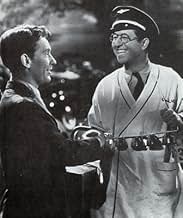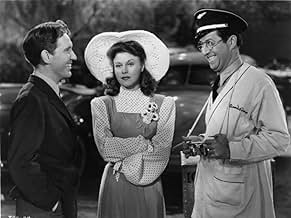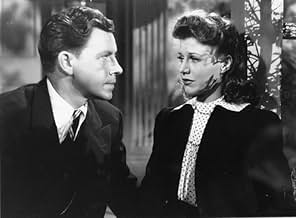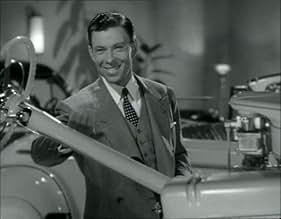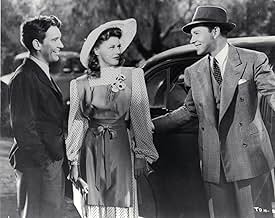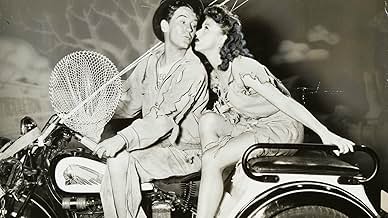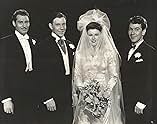IMDb RATING
6.3/10
1.3K
YOUR RATING
Working girl Janie is proposed to by a conservative car salesman, a bohemian auto mechanic, and a millionaire playboy and must make a choice.Working girl Janie is proposed to by a conservative car salesman, a bohemian auto mechanic, and a millionaire playboy and must make a choice.Working girl Janie is proposed to by a conservative car salesman, a bohemian auto mechanic, and a millionaire playboy and must make a choice.
- Nominated for 1 Oscar
- 4 wins & 1 nomination total
Vickie Lester
- Paula
- (as Vicki Lester)
Edward Colebrook
- Stalled Car Driver
- (scenes deleted)
Dorothy Lloyd
- Gypsy Oracle
- (scenes deleted)
Gertrude Short
- Bridge Matron
- (scenes deleted)
William Alland
- Newsreel Announcer
- (voice)
- (uncredited)
Michael Audley
- Usher
- (uncredited)
Joseph E. Bernard
- Judge in Dream
- (uncredited)
Maurice Brierre
- French Waiter
- (uncredited)
Jack Briggs
- Boy in Dream
- (uncredited)
Featured reviews
"Tom Dick and Harry", a delightful screwball comedy, features Ginger Rogers sans singing and tapping. Rogers is cast as a telephone operator living with family and the eldest of two daughters. At first she seems a bit mature for the role but turns in a good performance as the comedy and surrealistic sequences become increasingly engaging along with the social-commentary subtext of traveling in various social circles to supplement the plot: Rogers on a whirlwind-whim steps out of an unfulfilling job and pursues an ultimate soulmate/marriage/happiness. Some scenes surprisingly echo "The Philadelphia Story" (1940) in an inverted economic pearls-at-a-price manner: after an evening of mayhem lasts into wee-morning hours and before the "life-altering" event, an ultimate awakening dawns upon working-class Rogers similar to high-society Hepburn. Also, similar to TPS, TD&H has the wisecracking-realistic younger sister balancing the impulsive older sister Rogers; the supporting cast delivering the sideshow goods; and viewers getting the surprise-ending treat. Trivial tidbit: Lenore Lonergan, (the younger sister "Butch" to Rogers's "Janie" in TD&H), is cast in the original Broadway version of TPS as the younger sister "Dinah" to Hepburn's "Tracy", (however in the film version of TPS, Virginia Weidler plays the younger sister "Dinah" part).
This is a silly movie, to the point that Ginger Rogers' character blurts out "This is Ridiculous!" at one point close to the end. But it also has the self awareness to not take things too far. Rather it brings things to the brink of absurdity and stops just before going off the cliff. Rogers' performance is solid as the clueless Janie who must decide between three suitors. Murphy, Marshal, and Meredith turn in good performances as well as their respective characters Tom, Dick, and Harry. Meredith, as Harry, stands out among the three. The plot also revolves around the whirlwind courtship and marriage theme that is common in wartime movies. Viewers looking for a heavier more realistic romance should look to something like Roger's 1944 movie "I'll be Seeing You" where she plays a completely different character. But if you're in the mood for a whimsical, light-hearted hearted comedy to take your mind off the news, you could do much worse than Tom, Dick, and Harry.
8bjon
Ginger Rogers had that combination of dinginess and likability in this film. Only "The Major and the Minor" may rival this one. She certainly could turn on the charm.
Another interesting note about this one is that Burgess Meredith, who always tended to be typecast as somebody love-ably, slightly (depending on the film) unstable, managed to garner a bit of sex appeal in this one, and given the idea that he was the nonconformist in this film, he actually does live up to his usual reputation. The sex appeal was a rarity for him, but that's not badmouthing him at all about his "stage" presence. He was great in just about everything, and who could forget that voice?
I wish I could purchase this one!
Another interesting note about this one is that Burgess Meredith, who always tended to be typecast as somebody love-ably, slightly (depending on the film) unstable, managed to garner a bit of sex appeal in this one, and given the idea that he was the nonconformist in this film, he actually does live up to his usual reputation. The sex appeal was a rarity for him, but that's not badmouthing him at all about his "stage" presence. He was great in just about everything, and who could forget that voice?
I wish I could purchase this one!
Ginger Rogers plays Janie, a girl who is not only incredibly beautiful (even as a brunette), sweet and charming. But a girl who has three of the lovliest men after her, She must choose between a millionaire, a car salesman and a mechanic, you'll never guess who wins. This film is filled with fun and sentiment from start to finish, Ginger is great as ever but she has her film stolen from her by the lovely and charming Burgess Meredith. Meredith is the strange mechanic, who loves nothing more than fun except Janie and will do anything to get either.
George Murphy is good in an early role as the car salesman and when He has to drive "prospective buyer" Harry (Meredith) and Janie to a lovers point the screen fills with anger. Dick is the millionaire and he remains pretty anonymous, with little charachterisation by alan marshall.
Overall this film is hopelessly enjoyable and hard to dislike
George Murphy is good in an early role as the car salesman and when He has to drive "prospective buyer" Harry (Meredith) and Janie to a lovers point the screen fills with anger. Dick is the millionaire and he remains pretty anonymous, with little charachterisation by alan marshall.
Overall this film is hopelessly enjoyable and hard to dislike
The expression "Tom, Dick and Harry" is a commonly-used colloquialism in English, meaning "everybody" or "anybody", but this film is about three men who just happen to have those names. The main character is Janie, a young woman who works in a telephone exchange and who has the sort of obliging personality which means she just can't say "no" to anybody, especially a good-looking young man. So it happens that she ends up engaged to three men from three different social backgrounds at the same time, middle-class car salesman Tom, working-class garage mechanic Harry and upper-class Dick, the son of the local millionaire. All three are young and good-looking, but all have their drawbacks; Tom is a bit too staid and conservative, Harry a bit too eccentric and Dick a bit too smooth and slick.
There's not really a lot more to the plot than that, apart from waiting to see which of the three men Janie will eventually end up marrying. In real life, of course, no woman would ever behave like this unless she were either a heartless flirt or not quite right in the head, but this is a screwball comedy, a film genre which acknowledges the existence of real life but does not consider itself bound by the rules and conventions that prevail there. It is, however, a tribute to Ginger Rogers' comedic talents that she manages to make her character seem not only plausible but also reasonably sympathetic.
Even in 1941 this film was probably not seen as anything more than a light-hearted bit of trivia, although it does manage a serious bit of political comment when a cinema audience are shown booing a newsreel showing Hitler. (The film was made before Pearl Harbor, but Hollywood had declared war on the Third Reich long before Washington followed suit). It is made in the "filmed theatre" style popular for low-budget films of the period- more dialogue than action, most scenes taking place indoors and everything seemingly filmed on one camera with no cross- cutting or tricky camera work. Today it is largely forgotten, but Ginger manages to invest it with enough period charm to make it (just about) worth watching. 6/10
There's not really a lot more to the plot than that, apart from waiting to see which of the three men Janie will eventually end up marrying. In real life, of course, no woman would ever behave like this unless she were either a heartless flirt or not quite right in the head, but this is a screwball comedy, a film genre which acknowledges the existence of real life but does not consider itself bound by the rules and conventions that prevail there. It is, however, a tribute to Ginger Rogers' comedic talents that she manages to make her character seem not only plausible but also reasonably sympathetic.
Even in 1941 this film was probably not seen as anything more than a light-hearted bit of trivia, although it does manage a serious bit of political comment when a cinema audience are shown booing a newsreel showing Hitler. (The film was made before Pearl Harbor, but Hollywood had declared war on the Third Reich long before Washington followed suit). It is made in the "filmed theatre" style popular for low-budget films of the period- more dialogue than action, most scenes taking place indoors and everything seemingly filmed on one camera with no cross- cutting or tricky camera work. Today it is largely forgotten, but Ginger manages to invest it with enough period charm to make it (just about) worth watching. 6/10
Did you know
- TriviaDuring the shooting of this film, Ginger Rogers won the Academy Award® for Best Actress for her previous film, Kitty Foyle (1940). The day after, all of the male cast and crew met her on the set in top hats and tails.
- GoofsThe titles schedule Phil Silvers as "Ice Cream Man" rather than as a character with a name, but, on one occasion, one of them greet him as "Phil" which is, of course, his real name outside the movie.
- Quotes
Phil - Ice Cream Vendor: You don't have to yell at me because I'm a little obnoxious
- Crazy creditsIn the opening titles, it shows some of the names spelled incorrectly, then the letters tumble to the bottom of the screen, scramble themselves and return to their original position, with the correct spellings. This is how they appear: SNIRGOR GREEG = GINGER ROGERS GREGORE YUMPH = GEORGE MURPHY HASALMAR NALL = ALAN MARSHAL ESSRUDE MITHGREB = BURGESS MEREDITH SERT BORISK = ROBERT SISK RILA COJURPA = PAUL JARRICO OSKAR INGNAN = GARSON KANIN
- ConnectionsFeatured in Hollywood the Golden Years: The RKO Story: A Woman's Lot (1987)
Details
Box office
- Budget
- $806,000 (estimated)
- Runtime1 hour 27 minutes
- Color
- Aspect ratio
- 1.37 : 1
Contribute to this page
Suggest an edit or add missing content


